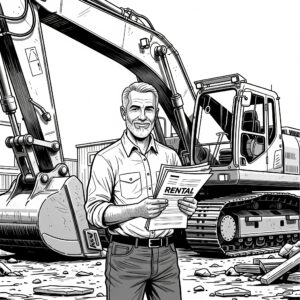Overview
For the typical weekend warrior or DIYer, renting an excavator or other heavy equipment can be challenging. Below are three common misconceptions about renting equipment that you need to know before walking into a dealership.
1. “I’m sure I can figure it out.”
How many dangerous situations occur with the statement “I’m sure I can figure it out.” Painting your house or changing your brakes can be troublesome; however, it’s very low risk. You can afford a new can of paint if you mess up but you can’t afford a new excavator. Renting an excavator or other types of heavy equipment is an entirely different animal.
Mini excavators cost, on average, between $40,000-$60,000. Attachments for mini excavators can cost an additional $5,000. Simply because of how expensive these machines are, it would be wise to get some training.
Caterpillar offers Operator Training specifically designed for entry-level operators with less than 2-years of experience. Caterpillar also has Demonstration and Learning Centers through local dealers. At the very least, YouTube can be a free and insightful source of learning if you’ve never operated heavy machines before.
Caterpillar Operator Training Link
2. “Oh, I am sure they have it.”
In case you hadn’t heard, the world has experienced some crazy things during the past 18 months. Unfortunately, the equipment industry is not immune to economic pressure. Equipment dealers are finding creative ways to keep their rental fleet strong while it is becoming increasingly difficult to obtain equipment and parts. So, if you have a project in mind and need a specific piece of equipment, don’t hesitate to rent.
Also, choosing the Dealer that best fits your needs can be daunting. Before you begin the rental process, be sure to research what you can on the internet. Dealer location, equipment inventory, customer service, and insurance coverage should all be factors in your decision-making process.
3. “I don’t need the insurance. Just give me the keys.”
If you’ve ever rented a car, you know how quickly fees can accumulate without you even noticing. Most car rental companies automatically add insurance to the rental price without even consulting the customer. Also, they seldom explain what their insurance covers. Consider the example below to understand this concept in greater detail.
EXAMPLE: Hertz Car Rental Breakdown
- Vehicle Rental – $70 per day
- Collision Damage Waiver (CDW) – $11 per day
- Liability Coverage – $17.50 per day
- Personal Effects Coverage (PAI) – $6.95 per day
- Unlimited Toll Fees – $10.00 per day
As stated above, the rental company will rarely openly disclose what the insurance covers. Therefore if you don’t ask, you could be on the hook for damages to the vehicle, others, or their property. However, it’s not always required to get insurance on your rental car. Here is where the equipment industry starts to deviate.
What to Expect from a Large Dealership
Equipment dealers always require their renters to obtain physical damage coverage (coverage that protects the equipment). Some larger equipment dealers have coverage options similar to a car rental company. However, not all damage waivers are created equal. Most damage waivers offered by dealers only include an FTV (fire, theft, and vandalism). FTV means that damages caused by overturns, collisions, falling objects, etc., are not covered. So, while you have “coverage” from the dealer, it’s partial coverage at best and minimal coverage at worst.
With that being said, this is not always the case. JT Bates Group provides a damage waiver call REP™ to many dealers across the country, including Caterpillar, Komatsu, Kubota, and more. This option supersedes any other damage waiver on the market to ensure that you, the renter, are protected.
What to Expect from a Small Dealership
Unfortunately, many smaller dealerships do not offer their own damage waiver. In this instance, the renter would be required to purchase coverage separately through a third party. Placing the equipment on your homeowner’s policy is a potential option, but it will most likely result in an increased rateif the equipment is damaged.
Wrap-Up
So what does all this mean? We hope you have the following key takeaways:
- Renting equipment is NOT like renting a car – Renting heavy equipment requires much more care and concern during the rental process, especially because the cost to repair equipment is so high. For referrence, the average cost of a backhoe ($50,000-$90,000) is 2 to 4 times more than the average used car ($25,000).
- Do your research – Before you go out and rent a dozer when you actually need a backhoe, do your research. Make sure that you’re renting the right equipment for the right job. Also… make sure that you know how to operate it.
- Get your money’s worth – Since you will have to pay for equipment insurance, make sure it actually covers the most likely damage to equipment. Regardless of who is offering the policy, read it, ask questions about it, and understand it before you make the purchase. (Pro tip: collisions represent some of the most common losses we see, so it would be wise to make sure collision is covered!)




